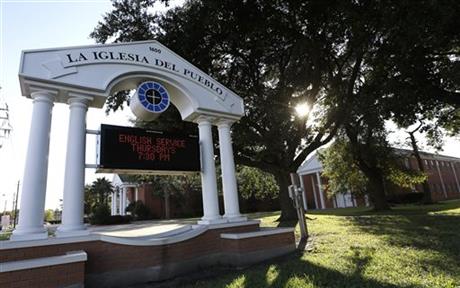
By PAUL J. WEBER
When the movie “Urban Cowboy” made this refinery town famous in 1980, the honkytonk Gilley’s was booming and wannabe cowpokes from the white Houston suburbs flocked here to drink and dance. Houston was the big city, but Pasadena was for kicks.
Today Pasadena is a mostly working-class Hispanic suburb that looks as hard-ridden in some pockets as the mechanical bull that bucked John Travolta. Gilley’s burned down years ago. Now a federal lawsuit accuses the town’s white councilmembers of leading a discriminatory plan to turn back the clock.
Pasadena is preparing to change the makeup of its city council in a way that city fathers hope fosters new development, but that some Hispanics allege dilutes their influence. The case could become a test of the Supreme Court ruling last year that struck down most of the federal Voting Rights Act, giving cities in many Southern states new latitude to change election laws affecting minorities without first getting federal approval.
“Clearly it was racism,” said Pasadena Councilman Ornaldo Ybarra, one of two Hispanics on Pasadena’s eight-member council, about the town’s planned council changes. The campaign for a new voting system “was meant to scare Anglos, and it was effective,” he said.
In Pasadena, which is roughly 60 percent Hispanic, voters approved a referendum that replaces two city council seats representing districts with at-large seats, which Hispanic leaders say will negate their growing population numbers. The new format was proposed by the mayor, who is white, in July 2013, one month after the high court decision.
The mayor and supporters insist the new format will bring more participation by all Pasadena residents because they’ll have more to vote for. They note that other cities, including Houston, have at-large council members.
The change comes as city leaders are pressing for more investment to boost the local economy. Supporters say at-large council members are more likely to consider a city’s larger interests than the concerns of individual districts.
Since its Gilley’s heyday, Pasadena’s cachet has gradually been swallowed by newer, more affluent suburbs. Well-paid refinery hands and white-collar downtown commuters moved away, and whites are now mostly concentrated in Pasadena’s south side. Gilley’s old address is now a used-car lot. Even the ground under the aging city hall building is sinking.
To turn things around, the mayor and allies are angling for new entertainment district that could include a dance hall on the south side. The council could move forward on the idea after the new voting system takes effect following elections in May.
But Ybarra and some other residents say they fear the projects will cost money needed for improving services in the city’s low-income neighborhoods.
“If it doesn’t work out, then the city is left with a vacant building. The city is already full of vacant buildings,” said Jennifer Halvorson, 40, a lifelong Pasadena resident, about the prospects of another dance hall.
Mayor Johnny Isbell declined to discuss the lawsuit. But Pat Riley, a former mayor pro-tem, said the change in council seats won’t prevent Hispanic residents from making their wishes known.
“I don’t think it’s taken anything away from them. If that’s the case, why can’t they run somebody they want in there and vote for them?” said Riley, who moved to Pasadena in 1942 and recalled having just one Hispanic in her high school class.
Some Hispanics fear that wealthier white candidates will have the upper hand in at-large races that demand costlier citywide campaigns.
Suing the city on behalf of five Hispanic residents is the Mexican American Legal Defense and Education Fund, which also took Texas to court over the state’s new voter ID law.
Since the Supreme Court ruling last year, most attention has focused on statewide-voting changes made in some of the 15 states covered by the Voting Rights Act, which was passed during the Civil Rights era. The Pasadena case is one of the first involving a city.
The plaintiffs face the burden of proving intentional discrimination. Civil rights attorneys say they worry that the money and effort of mounting a challenge will discourage action in many cities.
When a school board parish in Baton Rouge, Louisiana, redrew voting districts a month before an election, opponents sought to invalidate the changes under an administrative loophole in state court, where the costs and threshold for victory are lower, said Alfreda Tillman Bester, attorney for the Louisiana State Conference of the NAACP. But the challenge failed.
Attorneys who helped dozens of Texas cities and counties redraw their political boundaries after the 2010 Census said cities moving to change their election systems aren’t necessarily attempting to discriminate, and are eager to move beyond the bureaucratic process of the Voting Rights Act.
“Not because of nefarious purposes,” said Chris Gober, a conservative Austin attorney who has represented Republicans in redistricting cases. Previously, “The bottom line…is that it imposed real administrative burdens.”
___



